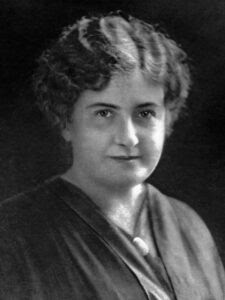Maria Montessori (31 Aug 1870 – 6 May 1952): The Spirit of Education for World Citizenship
BIOGRAPHIES, 31 Aug 2020
René Wadlow – TRANSCEND Media Service
Maria Montessori, an Italian childhood educator and world citizen, would have been pleased at the efforts of the United Nations and UNESCO to promote Global Citizenship Education. (1) Montessori argued for a child’s dignity and autonomy and for the ability of the child to break out of the narrow bonds of nationalistic education. She stressed that children have a unique consciousness and a special sensitivity in the early years which must be nurtured and allowed to develop along its own course.
The world citizen spirit of Maria Montessori’s teaching displeased the narrow nationalist leaders in power in the 1930s. The Fascist government of Mussolini closed the Montessori schools in Italy in 1934 as did Hitler in Germany and then in Austria when Hitler’s troops moved into Vienna. The dictators saw that creative thinking among children was a danger to their authoritarian rule. She spent the Second World War years in India where her educational ideas influenced a growing number of Indian teachers.
She stressed education for world citizenship in both content and methodology for as she pointed out access to education and to various forms of learning is a necessary but not sufficient condition to world citizenship education. A comprehensive system of education and training is needed for all groups of people and at all levels, both formal and non-formal. The development of a holistic approach based on participatory methods is crucial.
Education for world citizenship today builds upon the values and activities of the UN-designated International Decade for a Culture of Peace and Non-violence for the Children of the World (2001-2010). The UN General Assembly proclaimed the International Decade stating that the Decade
“would greatly assist the efforts of the international community to foster peace, harmony, all human rights, and democracy throughout the world.”
The Decade was to lead to
“the promotion of democracy, tolerance, dialogue, reconciliation and solidarity as well as to international cooperation and economic development, and thus to sustainable human development.”
In education for world citizenship it is necessary to embrace all facets of human experience. Such education must prepare us to help meet the challenges which we face, challenges so vast, so complex and so constantly changing their nature and scope. Education for world citizenship must prepare us collectively to know the yet unknown. Our physical, social, and spiritual development expands naturally from the personal towards the global. This learning process leads through both chartered and unchartered territory in an ongoing exploration of life.
The visionary and yet very practical educational spirit of Maria Montessori remains an inspiration as we develop world-wide educational forms to prepare us for the emerging world society.
NOTE:
1) UNESCO has produced a very useful guide “Global Citizenship Education: Topics and Learning Objectives” with a good bibliography and websites of organizations dealing with education for global citizenship. See their website for further information www.unesco.org/
______________________________
 René Wadlow is a member of the TRANSCEND Network for Peace Development Environment. He is President of the Association of World Citizens, an international peace organization with consultative status with ECOSOC, the United Nations organ facilitating international cooperation and problem-solving in economic and social issues, and editor of Transnational Perspectives.
René Wadlow is a member of the TRANSCEND Network for Peace Development Environment. He is President of the Association of World Citizens, an international peace organization with consultative status with ECOSOC, the United Nations organ facilitating international cooperation and problem-solving in economic and social issues, and editor of Transnational Perspectives.
Copyright mediaforfreddom.com

